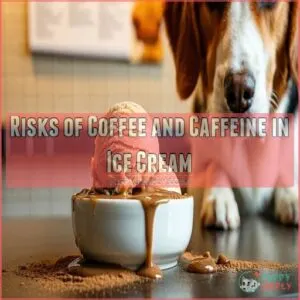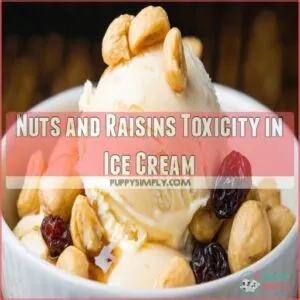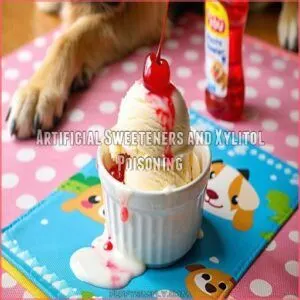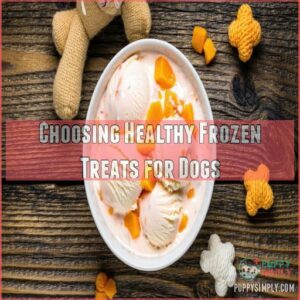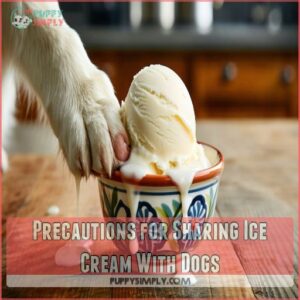This site is supported by our readers. We may earn a commission, at no cost to you, if you purchase through links.
 You can safely share plain vanilla ice cream with your pup as an occasional treat, but there’s a catch.
You can safely share plain vanilla ice cream with your pup as an occasional treat, but there’s a catch.
Many dogs are lactose intolerant, which means too much dairy can lead to an upset tummy.
Skip flavors containing chocolate, coffee, nuts, or artificial sweeteners – they’re toxic to dogs.
For a safer frozen treat, try doggy ice cream made with peanut butter, pumpkin, or banana.
Just like humans watching their waistlines, moderation is key for your four-legged friend.
Your pup’s tail will wag even harder when you discover our vet-approved frozen treat recipes that are both delicious and nutritious.
Table Of Contents
- Key Takeaways
- Lactose Intolerance in Dogs
- Can Dogs Eat Ice Cream Safely
- Toxic Ingredients in Ice Cream
- Safe Alternatives to Ice Cream for Dogs
- Precautions for Sharing Ice Cream With Dogs
- Frequently Asked Questions (FAQs)
- Do dogs eat ice cream?
- What kind of ice cream can people with diabetes eat?
- Can dogs eat vanilla ice cream?
- Can diabetic dogs eat ice cream?
- Can dogs eat ice cream sandwiches made for humans?
- Can dogs eat ice cream if they are lactose intolerant?
- What kind of ice cream is safe for dogs?
- Is it okay to give a dog ice cream?
- Can I give my dog a lick of vanilla ice cream?
- Can dogs eat dq vanilla ice cream?
- How much ice cream can I give my dog?
- Can puppies have ice cream as a treat?
- Does ice cream temperature affect my dogs digestion?
- Are there breed-specific concerns with feeding ice cream?
- Can ice cream help cool down overheated dogs?
- Conclusion
Key Takeaways
- You can share plain vanilla ice cream with your dog in tiny portions, but it’s safer to choose dog-specific frozen treats.
- Avoid ice creams with chocolate, nuts, coffee, or artificial sweeteners, as they are toxic to dogs.
- Most dogs are lactose intolerant, so opt for lactose-free options like frozen yogurt or homemade "nice cream."
- Monitor your dog for signs of digestive trouble after eating ice cream, and consult your vet for personalized advice.
Lactose Intolerance in Dogs
While your furry friend might love the taste of ice cream, you should know that most dogs can’t properly digest dairy products because they lack the enzyme needed to break down lactose.
Dairy products can lead to uncomfortable symptoms like stomach upset, diarrhea, and gas.
Common Symptoms of Lactose Intolerance
Within hours of eating ice cream, your dog might show telltale signs of lactose intolerance, similar to those experienced by dogs that eat cream cheese with lactose.
Watch for stomach pain, which often shows up as restlessness or a hunched posture.
You’ll likely notice loose stools or diarrhea, and your pup might start vomiting.
Gas is another common symptom – and trust me, you’ll know when it hits!
These signs typically appear because dogs can’t properly digest dairy products.
Differences Between Lactose Intolerance and Milk Allergy
While both lactose intolerance and milk allergies can upset your dog’s stomach, they’re quite different.
Lactose intolerance happens when your pup can’t break down milk sugar, causing digestive issues.
A milk allergy, on the other hand, triggers your dog’s immune system to fight milk proteins, leading to more serious reactions like itchy skin, hives, or even breathing problems.
How Lactose Intolerance Affects Dogs
Understanding how lactose affects your furry friend helps distinguish between an allergy and intolerance.
Your dog’s ability to process dairy changes as they age, much like humans who become lactose intolerant.
If your dog is lactose intolerant, you can still treat them to lactose-free ice cream options, such as those available at Lactose Free Treats.
Here’s what happens when your lactose-intolerant pup eats ice cream:
- Their digestive system struggles to break down lactose
- Stomach discomfort kicks in within 30 minutes
- Diarrhea often follows 2-3 hours later
- Gas and bloating can last up to 24 hours
Can Dogs Eat Ice Cream Safely
Your dog’s sad puppy eyes when you’re enjoying ice cream might make you want to share, but let’s look at what’s safe. Just like some humans, many dogs struggle with dairy – it’s not just about lactose intolerance anymore. You can also find a variety of dog safe ice cream on websites like dog safe ice cream stores.
| Safety Level | Type of Ice Cream | Best Practices |
|---|---|---|
| Safe | Dog-specific brands | Follow serving size |
| Caution | Plain vanilla | Tiny portions only |
| Avoid | Most human brands | Too much sugar/fat |
Here’s the scoop: regular ice cream packs too much sugar and fat for your furry friend. Even a small serving can lead to weight gain and dental issues. Plus, many dogs can’t properly digest dairy products after puppyhood.
Dogs can’t eat regular ice cream due to lactose intolerance in dogs, so consider safer options. Instead of sharing your cone, try dog-friendly ice cream brands like Ben & Jerry’s Doggie Desserts or make simple frozen treats at home. Your pup will thank you with tail wags and better health!
Toxic Ingredients in Ice Cream
You’ll want to watch out for several dangerous ingredients in ice cream that can make your dog seriously sick, including chocolate, coffee, nuts, and artificial sweeteners.
While you might think sharing your favorite frozen treat is harmless, these common ice cream ingredients can cause severe reactions in dogs, from stomach problems to life-threatening conditions.
Dangers of Chocolate Ice Cream for Dogs
Among all ice cream flavors, chocolate poses the most severe threat to your furry friend. Even small amounts of chocolate ice cream can lead to dangerous symptoms in dogs due to theobromine and caffeine content.
Think of it like kryptonite for your four-legged Superman – it’s best to keep it far away.
- Mild poisoning causes vomiting, diarrhea, and restlessness
- Moderate cases trigger muscle tremors and increased heart rate
- Severe reactions can result in seizures and heart problems
- Dark chocolate varieties are more dangerous than milk chocolate
Risks of Coffee and Caffeine in Ice Cream
Coffee-flavored ice cream packs a dangerous punch for your furry friend.
Just like chocolate, caffeine can trigger serious health issues in dogs.
When your pup indulges in coffee ice cream, they might experience racing heart, restlessness, or muscle tremors.
In severe cases, caffeine poisoning can lead to seizures or collapse.
Think of it like giving a toddler five espresso shots – it’s just not worth the risk.
Nuts and Raisins Toxicity in Ice Cream
While caffeine poses risks, certain ice cream mix-ins pack an even nastier punch for your pup.
Macadamia nuts can trigger severe reactions, from muscle weakness to depression.
And those innocent-looking raisins? They’re kidney killers for dogs, even in small amounts.
Before sharing that rocky road or rum raisin, check the ingredient list carefully – these seemingly harmless additions could land your furry friend in the ER.
Artificial Sweeteners and Xylitol Poisoning
Artificial sweeteners in sugar-free ice cream pose a serious threat to your dog.
Xylitol, commonly found in these treats, triggers a rapid insulin release that can send your pup’s blood sugar crashing within minutes.
Even small amounts can be life-threatening, leading to seizures, liver failure, or worse.
Just like you wouldn’t give your dog a sugary drink like apple juice for dogs, skip the diet desserts altogether – it’s not worth the risk to your furry friend’s health.
Safe Alternatives to Ice Cream for Dogs
You don’t have to give up treating your furry friend just because traditional ice cream isn’t safe for dogs.
Dog-friendly frozen alternatives are readily available, from homemade "nice cream" made with frozen bananas to specially formulated commercial treats that’ll keep your pup cool and happy.
Frozen Yogurt as a Substitute for Ice Cream
Looking for a cool treat that won’t upset your pup’s tummy? Frozen yogurt can be a better choice than ice cream, since it contains less lactose and is easier to digest.
Here’s what makes frozen yogurt a safer option:
- Contains beneficial probiotics that support gut health
- Has lower fat content than traditional ice cream
- Offers more protein and calcium per serving
Just remember to choose plain, fat-free varieties without artificial sweeteners.
Making Dog-Friendly Nice Cream at Home
Making your pup’s nice cream at home is easier than you’d think!
Just grab some ripe bananas, freeze them overnight, and blend until smooth.
You can jazz it up with dog-safe ingredients like peanut butter (xylitol-free), plain yogurt, or pumpkin puree.
For a cool twist, try blending frozen watermelon chunks or mashing up some blueberries.
Your furry friend will wag their tail for these cooling treats!
Choosing Healthy Frozen Treats for Dogs
You’ll find plenty of healthy frozen treats that your pup can enjoy safely.
Ben & Jerry’s Doggie Desserts offer a commercial option specifically made for dogs, while frozen fat-free plain yogurt provides an easily digestible alternative.
For more dog-friendly ice cream brands, check out popular dog ice cream brands.
Want to get creative? Try making "nice cream" by blending frozen bananas – it’s both nutritious and delicious.
Just remember to check ingredients carefully and avoid any artificial sweeteners, especially xylitol.
Fresh Fruits and Vegetables as Tasty Snacks
Fresh fruits and vegetables make perfect frozen treats for your pup when summer temperatures soar.
These natural snacks pack essential vitamins while keeping your dog cool and satisfied.
However, remember that not all treats are created equal, and some dogs may experience lactose intolerance symptoms if given dairy-based treats.
Here are some vet-approved options:
- Frozen apple slices (without seeds)
- Chilled watermelon chunks (seedless)
- Frozen carrot sticks
- Ice cube-sized pieces of frozen pineapple
Just remember to introduce new treats gradually and always remove any seeds or pits first.
Precautions for Sharing Ice Cream With Dogs
While you might be tempted to share your ice cream cone with your furry friend, you’ll need to take some important safety steps before offering this sweet treat.
You’ll want to check the ingredients carefully and keep portions tiny, as many dogs can’t properly digest dairy products and some ice cream ingredients can be dangerous for your pet.
Limiting Sugar and Dairy Intake in Dogs
Your pup’s health is super important, and keeping an eye on their sugar and dairy intake is key.
While an occasional lick of ice cream might seem harmless, it’s best to stick to recommended serving sizes and healthier alternatives.
| Treat Type | Daily Limit | Benefits | Risks |
|---|---|---|---|
| Regular Ice Cream | 1-2 small spoonfuls | Quick treat | Weight gain |
| Frozen Yogurt | 1-4 tablespoons | Less lactose | Added sugars |
| Nice Cream | ¼ cup | Natural sugars | Brain freeze |
| Frozen Veggies | ½ cup | Low calories | None |
Signs of Food Allergies and Sensitivities in Dogs
Spotting food allergies in your furry friend isn’t always a walk in the park.
Watch out for these red flags when introducing new treats or ice cream to your dog:
- Digestive troubles: Frequent vomiting, diarrhea, or excessive gas
- Skin reactions: Redness, itching, hives, or unusual paw licking
- Behavioral changes: Restlessness, scratching at ears, or rubbing against furniture
If you notice any of these signs, it’s time for a vet visit.
Choosing Dog-Friendly Ice Cream Flavors
Looking to treat your pup to some ice cream? Here’s what you need to know about dog-friendly flavors that won’t send you running to the vet.
| Safe Flavors | Unsafe Flavors | Why |
|---|---|---|
| Vanilla (plain) | Chocolate | Toxic to dogs |
| Strawberry | Coffee | Contains caffeine |
| Banana | Nutty flavors | Potential allergens |
Stick to simple, single-flavor options without mix-ins. Your best bet? Choose vanilla ice cream without artificial sweeteners, or better yet, try dairy-free alternatives made specifically for dogs.
Consulting With a Veterinarian for Personalized Advice
When introducing new fruits like cantaloupe to your dog’s diet, consulting cantaloupe safety guides can help you make informed decisions. Your vet knows your dog’s unique health history and can guide you through safe treat choices.
Before introducing any new foods, including ice cream alternatives, schedule a quick check-up.
They’ll factor in your pup’s age, weight, allergies, and existing conditions to recommend the best treats.
Plus, they can spot potential issues early and suggest personalized portions that keep your furry friend healthy and happy.
Frequently Asked Questions (FAQs)
Do dogs eat ice cream?
While Max the Labrador loves chasing ice cream trucks, dogs shouldn’t eat regular ice cream.
It can cause digestive issues and contains harmful ingredients.
Instead, try dog-friendly frozen treats like "nice cream" or frozen yogurt.
What kind of ice cream can people with diabetes eat?
People with diabetes can enjoy sugar-free ice cream made with artificial sweeteners, low-carb options, or no-sugar-added varieties.
Choose brands specifically labeled for diabetics and monitor portion sizes to maintain blood sugar levels.
Can dogs eat vanilla ice cream?
Nearly 70% of dogs are lactose intolerant.
While vanilla ice cream isn’t toxic, it’s not recommended for your dog.
You can offer safer alternatives like frozen yogurt or homemade fruit-based "nice cream" instead.
Can diabetic dogs eat ice cream?
Diabetic dogs should avoid pears due to their high sugar content. Diabetic dogs shouldn’t eat ice cream.
High sugar content can dangerously spike blood glucose levels and worsen their condition.
Instead, talk to your vet about sugar-free frozen treats specifically made for diabetic pups.
Can dogs eat ice cream sandwiches made for humans?
Ice cream sandwiches aren’t safe for your dog – they contain too much sugar, dairy, and potentially harmful ingredients like chocolate or artificial sweeteners.
Stick to dog-friendly frozen treats made specifically for your furry friend.
Can dogs eat ice cream if they are lactose intolerant?
Dogs with lactose intolerance shouldn’t eat regular ice cream as it can cause stomach upset and diarrhea.
Dog-friendly frozen treats or "nice cream" made from frozen bananas are better options.
What kind of ice cream is safe for dogs?
Plain, vanilla ice cream without artificial sweeteners is the safest option for your pup.
Dog-specific frozen treats or homemade "nice cream" from frozen bananas and other safe fruits are better alternatives.
Is it okay to give a dog ice cream?
While you might dream of sharing a sundae with your furry friend, it’s best to skip the ice cream.
Most dogs are lactose intolerant, and certain treats like mochi ice cream, which can lead to mochi’s choking hazards, and ice cream’s sugar, fats, and potential toxic ingredients pose health risks.
Can I give my dog a lick of vanilla ice cream?
A small lick of vanilla ice cream won’t harm most dogs, but it’s not ideal.
Look out for tummy issues or allergies.
Instead, offer dog-friendly treats like "nice cream" made from frozen bananas for a safer option.
Can dogs eat dq vanilla ice cream?
DQ vanilla ice cream isn’t the best choice for your dog.
It’s loaded with sugar and lactose, which can upset your pup’s stomach.
Consider safer treats like frozen yogurt or special dog-friendly ice creams instead.
How much ice cream can I give my dog?
Just like too much of a good thing can spoil the broth, a small lick or two of plain ice cream is okay for your dog occasionally.
Always opt for dog-safe flavors and check for harmful ingredients.
Can puppies have ice cream as a treat?
Puppies shouldn’t have ice cream as a treat due to lactose intolerance.
Their developing stomachs can’t handle it well, which might lead to discomfort or digestive upset.
Stick to puppy-safe treats that won’t upset their tummy.
Does ice cream temperature affect my dogs digestion?
Think of your dog’s tummy as a delicate snowflake.
Very cold ice cream can cause digestive upset; it’s best to let it soften slightly before offering it as a treat.
A little less chilly is much more comfy for their insides.
Are there breed-specific concerns with feeding ice cream?
Most dogs share similar concerns with ice cream, primarily lactose intolerance.
Breeds prone to obesity or sensitive stomachs, like Labradors or Bulldogs, might face heightened risks.
Always consider individual dietary needs before treating them.
Can ice cream help cool down overheated dogs?
Ice cream might cool your dog temporarily, but it’s not ideal due to lactose and sugar content.
Dog-safe alternatives like frozen fruits, such as kiwi when prepared correctly, including removing the skin to prevent digestive issues with kiwi skin, or fat-free yogurt, ensuring they stay refreshed without risking digestive issues.
Conclusion
Whether you’re enjoying a summer scoop or dreaming of winter treats, your dog’s health should always come first.
Plain vanilla ice cream is the safest bet if you want to share a treat, although the variety might tempt with its colorful array.
Remember, moderation is key, as lactose intolerance is common in dogs.
Avoid any ice cream with chocolate, nuts, or artificial sweeteners.
Check out dog-friendly options, so you can safely satisfy your pup’s sweet tooth.




